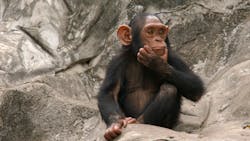Enjoy this “good read,” an excerpt from an article or other online source related to dentistry curated and shared with DentistryIQ readers.
"Six, 12, and 18. These are the ages that most people get their three adult molars or large chewing teeth towards the back of the mouth. These teeth come in at a much later age than they do in our closest living relative, the chimpanzee, who get those same adult molars at around three, six, and 12 years old. Paleoanthropologists have wondered for a long time how and why humans evolved molars that emerge into the mouth at these specific ages and why those ages are so delayed compared to living apes."
So states a ScienceDaily release detailing a study done by scientists at the University of Arizona and Arizona State University that attempts to unravel the discrepancy between when humans' molars emerge compared with living other primates. It's a study that could have long-term implications for clinical dentistry, including understanding impacted wisdom teeth.
Access the release: A study of skull growth and tooth emergence reveals that timing is everything
About the Author
Elizabeth S. Leaver
Digital content manager
Elizabeth S. Leaver was the digital content manager for Endeavor Business Media's dental group from 2021-2024. She has a degree in journalism from Northeastern University in Boston and many years of experience working in niche industries specializing in creating content, editing, content marketing, and publishing digital and magazine content. She lives in the Boston area.
